Coffee Basics
Cold Brew Vs. Iced Coffee: Health Benefits and Brewing Methods
Know the key differences between cold brew and iced coffee, from their brewing methods to health benefits, and discover which one suits you best!

When comparing cold brew and iced coffee, you'll find distinct brewing methods and health benefits. Cold brew steeps coarsely ground coffee in cold water for 12-24 hours, resulting in a smoother, less acidic drink that's easier on digestion. Iced coffee, brewed hot and then chilled, has a brighter taste but higher acidity. Regarding caffeine, cold brew often packs more punch due to its concentrated brewing ratio. Both drinks are rich in antioxidants, but cold brew may offer more health advantages overall. Want to explore more differences between these two popular options? You'll uncover interesting details ahead!
Key Takeaways
- Cold brew has lower acidity, making it gentler on digestion compared to the higher acidity of iced coffee.
- Both beverages are rich in antioxidants, with cold brew typically retaining higher concentrations due to its longer brewing time.
- Cold brew requires a long steeping time of 12-24 hours, while iced coffee can be prepared quickly with hot brewing methods.
- Cold brew generally has a higher caffeine concentration, potentially reaching up to 200 mg per 8 oz serving when made as a concentrate.
- Iced coffee offers a brighter, more acidic flavor profile, allowing for customization with milk and sweeteners to suit personal preferences.
Brewing Methods Comparison

When it comes to making your morning cup of joe, the brewing method can make all the difference. Cold brew and iced coffee are two popular choices, each with distinct processes.
Cold brew coffee is made by steeping coarsely ground coffee in cold or room-temperature water for 12-24 hours. This slow steeping process results in a smoother, less acidic concentrate, which is ideal for those looking for a gentler coffee experience. You'll need a coffee-to-water ratio of 1:4 for cold brew, making it more concentrated than iced coffee, and many coffee lovers enjoy its unique aroma that fills the home during brewing.
On the other hand, iced coffee is brewed hot, typically using a coffee maker or French press, and then chilled. It generally uses a coffee-to-water ratio of 1:17. While iced coffee provides a brighter flavor profile, it can be more bitter due to the hot brewing process.
Both methods have their perks; cold brew requires advance planning but is more hands-off, while iced coffee can be prepared quickly. You can customize either with milk, sweeteners, and flavorings, but cold brew often tastes creamier and sweeter.
Each method also has different caffeine content and health benefits, so choose the one that fits your morning routine!
Flavor Profiles Explained
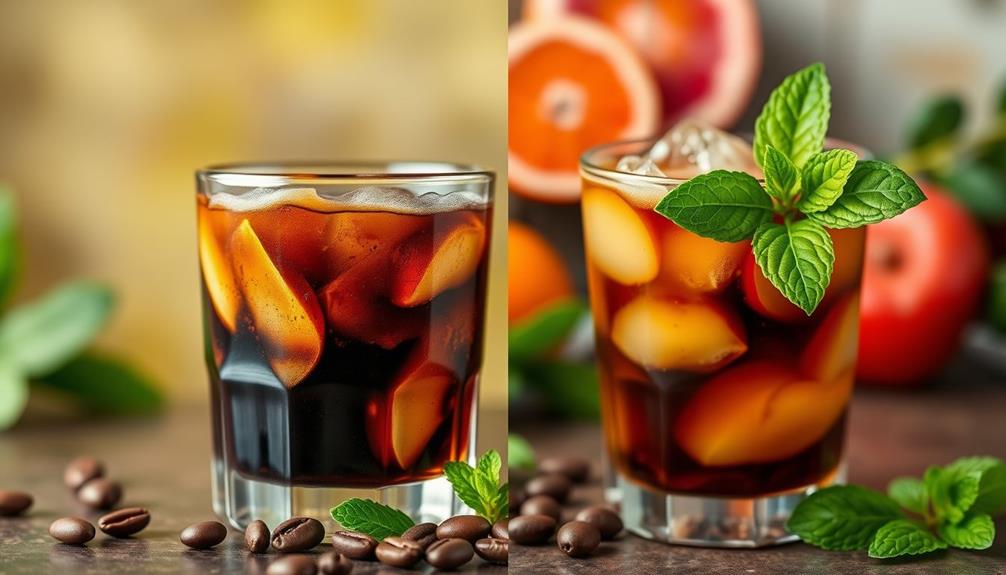
When you compare cold brew and iced coffee, the brewing methods play a significant role in shaping their flavor profiles.
Cold brew's slow extraction results in a smooth, sweet taste with chocolatey notes, often appealing to those who prefer a less acidic beverage. This method typically involves steeping coarsely ground coffee in cold water for an extended period, allowing for a unique extraction process that highlights the coffee's natural sweetness and depth numerous varieties available.
In contrast, iced coffee offers a brighter, more acidic flavor that can be quite bitter.
Understanding these differences helps you appreciate the unique characteristics each beverage brings to your cup.
Brewing Method Differences
Cold brew and iced coffee might seem similar at first glance, but their brewing methods lead to strikingly different flavor profiles. Understanding these differences can help you choose the right drink for your mood or preference.
Additionally, just like the careful selection of coffee beans can influence flavor, using essential oils for various health benefits can enhance your overall well-being, such as in essential oils for toothache relief.
- Brewing Method: Cold brew uses coarsely ground coffee steeped in cold or room-temperature water for 12-24 hours, while iced coffee is brewed with hot water and cooled over ice.
- Flavor Profile: The cold brew method results in a smoother, less acidic taste, emphasizing sweetness and notes of chocolate or nuts. In contrast, iced coffee retains a brighter, more pronounced acidity and bitterness.
- Coffee Concentration: Cold brew is often made at a 1:4 ratio, producing a higher caffeine content, whereas iced coffee typically uses a 1:17 ratio, resulting in a lighter brew.
- Preparation Time: Cold brew requires patience with its long steeping time and minimal equipment, while iced coffee can be quickly prepared with standard brewing devices.
These brewing method differences not only affect taste but also your overall coffee experience. Choose wisely to enjoy your perfect cup!
Flavor Characteristics Comparison
While both cold brew and iced coffee deliver a caffeine kick, their flavor characteristics set them apart significantly. Cold brew boasts a smooth and less acidic flavor profile, often described as chocolatey or nutty. This is thanks to the extended steeping process in cold water for 12-24 hours, which highlights the natural sweetness of the coffee beans.
In addition, the brewing process can be easily tailored to suit individual preferences, making it a versatile option for coffee lovers. For those interested in enhancing their home brewing skills, exploring espresso machines for home brewing can also elevate the coffee experience.
In contrast, iced coffee, brewed hot and then cooled over ice, retains a brighter and more acidic taste. This method can lead to a more pronounced bitterness when served chilled.
The brewing method plays a vital role in these differences. Cold brew is typically made with a stronger ratio of coffee to water (1:4 or 1:5), resulting in a concentrated drink that can be diluted without losing its robust flavor.
Iced coffee, on the other hand, usually follows a 1:17 ratio, which can make it taste lighter but also more acidic. Both beverages offer unique flavor experiences: cold brew is favored for its smoothness, while iced coffee is preferred for its bright, invigorating qualities.
Ultimately, your choice may depend on your taste preference or the health benefits you're seeking.
Caffeine Content Breakdown

Caffeine content can vary widely between cold brew and iced coffee, making it essential to understand their differences. Here's a breakdown of how they compare:
1. Cold Brew: It typically has a higher caffeine concentration due to its brewing method, using a coffee-to-water ratio of about 1:4. This can result in up to 200 mg of caffeine per 8 oz serving when made as a concentrate.
Additionally, understanding your personal risk tolerance with caffeine intake can help you choose the right beverage for your needs.
2. Iced Coffee: Generally, it has caffeine levels similar to hot coffee, depending on the brewing method and serving size. However, it's often diluted with water and ice, leading to a lower caffeine content.
3. Brewing Method: The coffee-to-water ratio for iced coffee is around 1:17, which makes it less concentrated compared to cold brew.
4. Coffee Beans: Both beverages' caffeine content can vary considerably based on the type of coffee beans used and the brewing time.
Understanding these factors allows you to adjust your drink to meet your desired caffeine intake, maximizing both taste and potential health benefits.
Health Benefits Overview

When it comes to health benefits, both cold brew and iced coffee offer unique advantages that can enhance your daily routine. Cold brew is less acidic than iced coffee, which makes it gentler on your digestive system and reduces the risk of acid reflux, especially for sensitive individuals. Both options are packed with antioxidants, which can lower the risk of diseases like type 2 diabetes and heart disease.
Here's a quick overview of their health benefits:
| Health Benefit | Cold Brew | Iced Coffee |
|---|---|---|
| Acidity | Lower acidity | Higher acidity |
| Caffeine Concentration | Higher, especially as concentrate | Moderate |
| Antioxidants | Rich in antioxidants | Also rich in antioxidants |
| Digestive Impact | Easier on the digestive system | Can be harsher |
| Overall Health | Supports mood & cognition | Supports mood & cognition |
Regular consumption of both beverages can support your overall health, with studies linking coffee intake to improved mood and cognitive function. Whether you prefer the smoothness of cold brew or the invigorating taste of iced coffee, you're making a health-conscious choice!
Cold Brew Coffee Details

Cold brew coffee is an invigorating alternative to traditional coffee, made by steeping coarsely ground beans in cold or room-temperature water for an extended period, typically 12 to 24 hours.
This brewing method results in a smooth, low-acid coffee concentrate that's not only delicious but also easy on your stomach. Additionally, cold medications overview emphasize the importance of selecting the right beverage for your health needs, especially when you're under the weather.
Here are some key aspects of cold brew coffee:
- Brewing Process: Use a 1:4 coffee-to-water ratio for optimum flavor, yielding a sweeter and less bitter flavor profile compared to hot-brewed coffee.
- Storage: Cold brew can be kept in the refrigerator for up to two weeks, making it convenient for batch preparation.
- Health Benefits: The lower acidity helps reduce the likelihood of acid reflux and digestive discomfort, especially for sensitive individuals.
- Chlorogenic Acid: Cold brew often contains higher levels of antioxidants like chlorogenic acid, providing additional health benefits.
Iced Coffee Insights

Iced coffee is a beloved summer staple that combines the bold flavor of hot-brewed coffee with the invigorating chill of ice. When you brew iced coffee, you typically use hot water, which retains a higher acidity and brightness compared to cold brew. This method often results in a more pronounced flavor profile that can be both revitalizing and invigorating.
However, it's important to enjoy iced coffee in moderation, as excessive sugar or cream can lead to health issues similar to those associated with indulgent treats like ice cream, which can contribute to weight gain and other health concerns high sugar and fat content.
You can create iced coffee using various brewing methods like pour-over, drip, or even espresso. The usual coffee-to-water ratio is around 1:17, ensuring a robust brew that holds up against the dilution from melting ice. This strength is essential for maintaining flavor integrity.
One of the best parts about iced coffee is its versatility. You can customize your drink with milk, sweeteners, or flavor shots to suit your preferences. Just keep in mind that the brewing process can lead to a more bitter taste, which you might want to balance out with cream or sugar.
Storage and Shelf Life

When it comes to storage, cold brew has the upper hand, lasting up to two weeks in your fridge thanks to its low acidity.
This longer shelf life allows for greater flexibility in enjoying your coffee throughout the week, making it a convenient choice for busy lifestyles.
In contrast, iced coffee's flavor fades quickly, so it's best to enjoy it fresh within a few hours.
Understanding these differences can help you make the most of your coffee experience, especially when considering investment strategies for maximizing your financial portfolio.
Cold Brew Longevity
The longevity of cold brew coffee is impressive, allowing you to enjoy your favorite beverage for an extended period without sacrificing flavor. Cold brew can be stored in the refrigerator for up to two weeks, thanks to its high concentration and low acidity. In contrast, iced coffee tends to lose its flavor quickly once cooled.
To maximize cold brew longevity, consider these storage techniques:
- Use airtight containers: This minimizes exposure to air, preserving flavor profiles. Additionally, similar to maintaining an air purifier, ensuring proper storage conditions can greatly enhance the quality of your cold brew over time. air purifier maintenance dos and don'ts
- Keep it concentrated: Diluted cold brew only lasts 2-3 days due to bacterial growth.
- Freeze for the future: You can freeze cold brew, but aim to consume it within six months for the best taste.
- Opt for coarsely ground coffee: This brewing method not only enhances the flavor but also aids in maintaining freshness.
Iced Coffee Freshness
Although iced coffee offers a revitalizing way to enjoy your favorite brew, its freshness can dwindle rapidly if not stored correctly. Once you brew iced coffee, you have a limited window to savor its ideal flavor, similar to how poolside entertaining requires careful planning to create the best experience.
Typically, its quality and taste begin to decline within a few hours, especially if it's exposed to air. To combat oxidation, always store your iced coffee in an air-tight container.
You can refrigerate your brewed iced coffee for up to three days, but be aware that the longer it sits, the more its flavor diminishes. An important tip is to brew iced coffee in small batches that you can consume within a couple of days. This reduces waste and guarantees you're always enjoying a fresh cup.
Also, remember that adding ice to hot-brewed coffee can dilute its flavor, making it less enjoyable as it cools. For the best experience, focus on brewing just enough to meet your needs without sacrificing freshness.
Personal Preferences Matter

Personal preferences greatly influence your choice between cold brew and iced coffee, as each offers distinct taste profiles. When deciding which one to savor, consider the following factors:
- Acidity: Cold brew is smoother and less acidic, making it a better option if you have sensitive stomach issues. Iced coffee retains a brighter, more acidic flavor, which some people enjoy.
- Convenience: Cold brew can be brewed in advance and stored for up to two weeks, offering hassle-free access. On the other hand, iced coffee tastes best when freshly made.
- Flavor Customization: Both beverages allow for sweetness and creaminess adjustments. Cold brew's natural sweetness might appeal to those who prefer a less bitter taste.
- Health Benefits: With its lower acidity, cold brew is often gentler on the digestive system, potentially reducing digestive issues for some drinkers.
Ultimately, your personal taste plays a significant role in determining your go-to drink.
As trends shift, cold brew's growing popularity among younger demographics highlights how preferences evolve, making it essential to explore what suits your palate best.
Recommendations for Coffee Lovers

For coffee lovers looking to enhance their brewing experience, choosing between cold brew and iced coffee can be exciting. Each option offers unique benefits, so consider your preferences.
| Feature | Cold Brew | Iced Coffee |
|---|---|---|
| Acidity | Less acidic (60% less) | Retains bright, acidic flavor |
| Caffeine Content | Higher concentration | Lower concentration |
| Flavor Profile | Smooth, rich, customizable | Bright, can be tailored with milk |
If you prefer a smoother, less acidic option, cold brew might be your go-to. It's easier on your stomach and teeth, plus it offers significant health benefits, such as high antioxidant levels. Alternatively, if you enjoy a brighter flavor profile, iced coffee is perfect for you; it can be customized with various milk and sweeteners.
For those keen on home brewing, cold brewing requires minimal equipment and is accessible for experimenting with different coffee flavors. Remember, both options can enhance your coffee experience. Embrace your inner coffee lover and try both methods to find your favorite!
Additional Coffee Insights
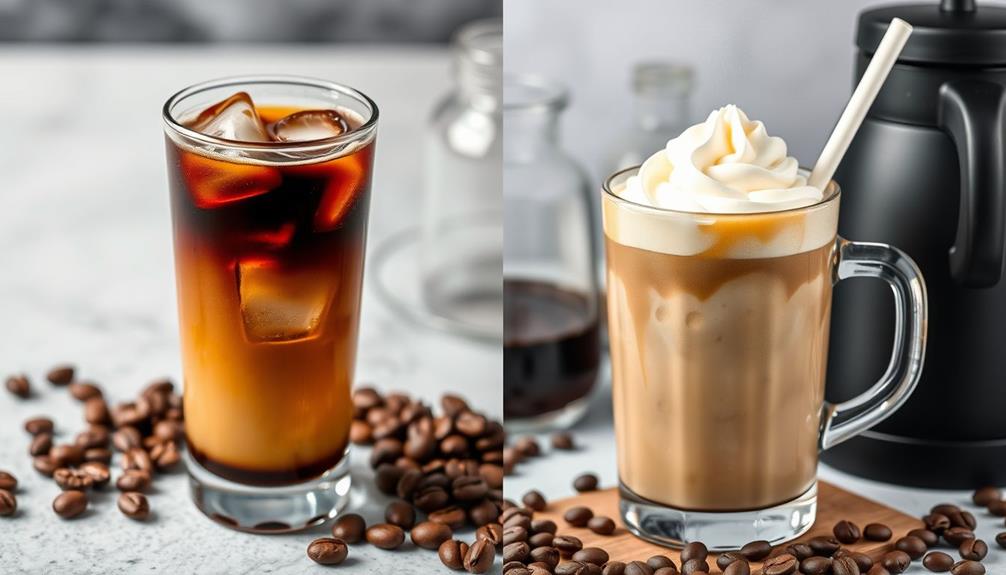
When you compare brewing techniques, you'll notice distinct differences in how cold brew and iced coffee are made.
Understanding their flavor profiles can enhance your appreciation for each drink, while exploring their health impacts reveals benefits that might surprise you.
Let's break down what sets these two invigorating options apart.
Brewing Techniques Comparison
The art of brewing coffee reveals distinct techniques that can considerably impact the final taste and experience.
In the ongoing iced coffee debate, understanding the brewing methods can elevate your coffee options.
Here's a quick comparison between cold brew and iced coffee:
- Cold Brew Method: Steeping coarsely ground coffee in cold or room temperature water for 12-24 hours results in a smoother, less acidic beverage.
- Brewing Ratios: Cold brew typically uses a 1:4 coffee-to-water ratio, while iced coffee relies on a 1:17 ratio, influencing strength and flavor.
- Equipment Needed: Cold brew requires minimal gear—just a jar or French press—whereas iced coffee often needs machines like drip coffee makers or espresso machines.
- Storage: Cold brew can last in the fridge for up to two weeks without significant flavor loss, while iced coffee is best enjoyed fresh, as it loses flavor rapidly once cooled.
Flavor Profiles Explained
Understanding the brewing techniques sets the stage for exploring the distinct flavor profiles of cold brew and iced coffee.
Cold brew, made from coarsely ground coffee steeped in cold water for an extended period, delivers a smoother, less acidic flavor profile. This brewing process emphasizes chocolatey and nutty notes, resulting in a naturally sweeter coffee concentrate that many find appealing.
In contrast, iced coffee retains the brightness and acidity of hot-brewed coffee, leading to more pronounced taste differences. The hot brewing method can introduce a bitterness that's less prevalent in cold brew, making iced coffee a more traditional choice for those who enjoy a revitalizing cup with a lively kick.
If you're looking for a complex flavor experience, cold brew might be your go-to, while iced coffee could be perfect for a crisp, energizing sip on a warm day.
Both beverages offer unique health benefits, and your preference may ultimately depend on whether you favor a smooth, sweet profile or a bright, bold taste.
Whatever you choose, you'll enjoy the delightful variety each coffee style brings to the table.
Health Impact Overview
Health benefits abound when it comes to enjoying cold brew and iced coffee.
These beverages not only delight your taste buds but also offer various health advantages that can enhance your well-being.
Here's a quick overview of their benefits:
- Lower Acidity: Cold brew is gentler on your stomach, reducing the chances of acid reflux, especially for sensitive drinkers.
- Antioxidant-Rich: Both drinks are packed with antioxidants, but cold brew generally retains a higher concentration due to its longer brewing process.
- Disease Risk Reduction: Regular consumption of coffee, including cold brew and iced varieties, is linked to a decreased risk of diseases like type 2 diabetes and Parkinson's due to their anti-inflammatory properties.
- Cognitive Function: Moderate intake of both beverages can boost cognitive function and support metabolism, thanks to their caffeine content.
Frequently Asked Questions
What's Healthier, Cold Brew or Iced Coffee?
When considering what's healthier, cold brew often wins due to its lower acidity, which can be gentler on your stomach. Its smoother flavor might help you reduce added sugars, making it a potentially better choice.
Is Cold Brew Easier on the Gut?
Imagine sipping a smooth, rich brew as it glides down your throat, soothing your stomach. Yes, cold brew's lower acidity and gentle flavor make it easier on your gut, offering a satisfying experience without discomfort.
Is Cold Brew Good for Your Liver?
Yes, cold brew's lower acidity and higher antioxidant levels can benefit your liver. Regular consumption might support liver health by reducing inflammation and improving enzyme levels, making it a gentler option for your digestive system.
Does Cold Brew Coffee Have More Antioxidants?
Think of cold brew as a treasure chest of antioxidants. Yes, it does have more antioxidants compared to traditional coffee. Its slow steeping process reveals these precious compounds, giving your health a delightful boost.
Conclusion
In the battle of cold brew vs. iced coffee, both offer unique flavors and health benefits, but it really boils down to your personal taste. Did you know that cold brew can contain up to 67% less acidity than traditional iced coffee? This makes it a gentler option for your stomach while still delivering that caffeine kick. So, whether you prefer the smoothness of cold brew or the invigorating bite of iced coffee, there's a perfect brew waiting for you!
In the vast and diverse world of coffee, coffee alternatives, and tea, Olivia has found her calling. As an author and a dedicated coffee and tea aficionado, her work for Cappuccino Oracle reflects her profound love and understanding of the intricate complexities found within these beverages. Olivia’s passion for the subject serves as both a catalyst for her creativity and a connection point with her audience.
Olivia’s appreciation for coffee, coffee alternatives, and tea blossomed at an early age. She discovered that these beverages invigorated her senses and stimulated her creative spirit. From the nuanced flavors of single-origin roasts to the captivating narratives intertwined with coffee, coffee alternatives, and tea trade and culture, Olivia found an unlimited source of inspiration in her daily cup.
Her love for these beverages and her talent for storytelling eventually converged at Cappuccino Oracle. As an author, Olivia’s mission is to illuminate the intricate tapestry that makes up the world of coffee, coffee alternatives, and tea. Her articles span a diverse range of topics, encompassing everything from the unique flavors of different brews to the sociocultural history intertwined with their cultivation and consumption.
Coffee Basics
How Much Is a Small Hot Coffee at Dunkin Donuts

At Dunkin Donuts, we understand the impact a great cup of coffee can have on brightening your day.
So, how much does a small hot coffee cost? Well, we’ve got the inside scoop for you.
In this article, we’ll break down the prices of various small hot coffee options at Dunkin Donuts. From regular to flavored, and even specialty coffees, we’ll help you find the perfect cup to start your day off right.
Let’s dive in and discover the affordable and delicious options waiting for you at Dunkin Donuts.

Key Takeaways
- Regular small hot coffee at Dunkin Donuts costs around $2.
- Dunkin Donuts offers a variety of flavored small hot coffees, including French Vanilla, Cinnamon, Hazelnut, Blueberry, and Caramel.
- Dunkin Donuts offers a range of specialty small hot coffees with flavors like caramel swirl, French vanilla, hazelnut, and mocha.
- Dunkin Donuts provides milk alternatives such as almond milk, oat milk, and coconut milk for those looking for a dairy-free option.
Regular Small Hot Coffee
We usually pay around $2 for a regular small hot coffee at Dunkin Donuts. When it comes to cost comparison, Dunkin Donuts is often seen as more affordable than other coffee chains. For those on a budget, this is great news.
In terms of caffeine content, a regular small hot coffee at Dunkin Donuts typically contains around 215 milligrams of caffeine. This amount can provide a good boost of energy for those who need it. However, it’s important to note that caffeine content can vary depending on the type of coffee beans used and the brewing method.
Flavored Small Hot Coffee
Moving on to the topic of flavored small hot coffee at Dunkin Donuts, our go-to choice for a caffeine boost and an indulgent treat. Dunkin Donuts offers a variety of flavored coffee alternatives to satisfy different taste preferences. These flavored coffees are created by infusing the beans with natural extracts and oils, providing a delightful twist to your regular cup of joe. The benefits of flavored coffee are twofold – they add an extra layer of flavor and aroma to your coffee, enhancing the overall experience, and they can help mask any bitter or unpleasant taste that may be present in the beans. Whether you prefer the rich sweetness of French Vanilla, the warm spice of Cinnamon, or the creamy indulgence of Hazelnut, Dunkin Donuts has a flavored small hot coffee to suit your desires.
| Flavored Small Hot Coffee | ||
|---|---|---|
| French Vanilla | Cinnamon | Hazelnut |
| Blueberry | Caramel |
Indulge yourself with these delicious flavor options and elevate your coffee experience at Dunkin Donuts.
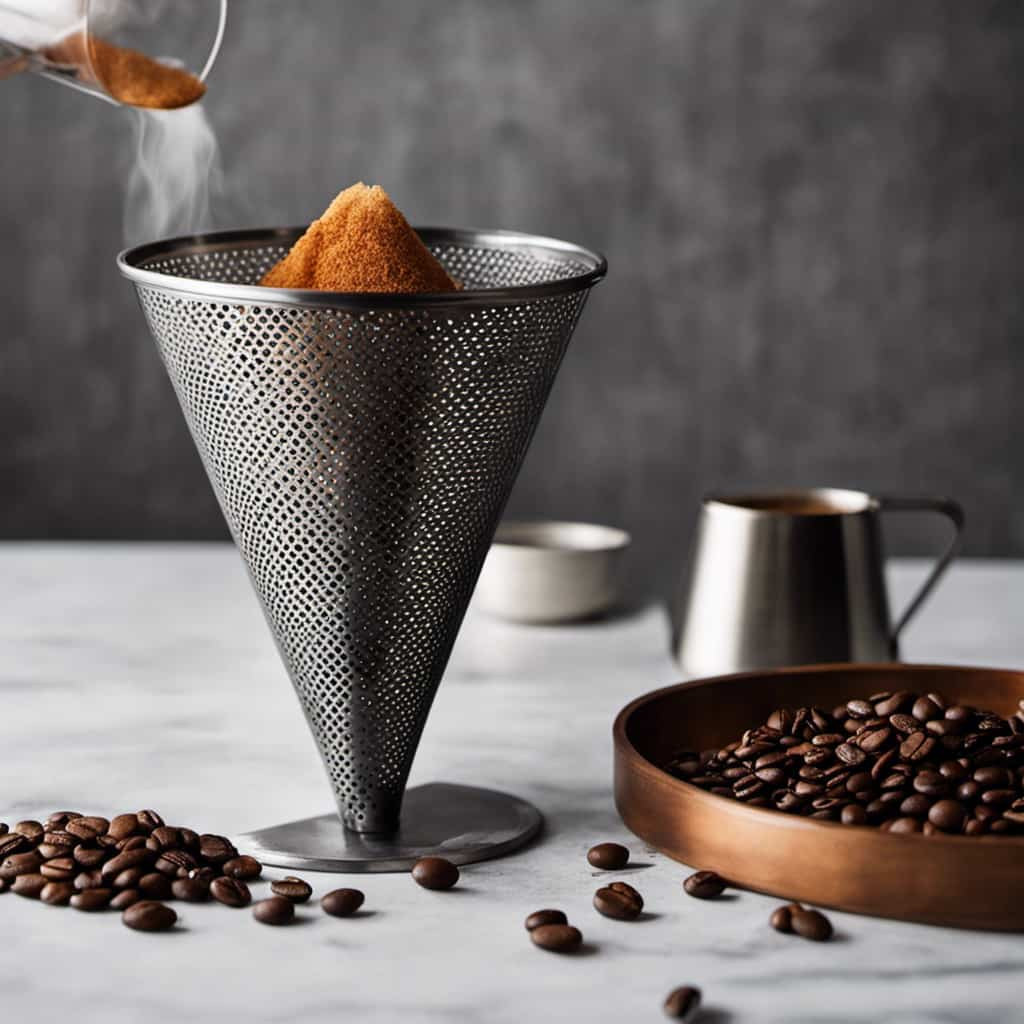
Specialty Small Hot Coffee
For our caffeine connoisseurs seeking a unique and flavorful experience, Dunkin Donuts offers a range of specialty small hot coffees. These specialty coffees are crafted with care and attention to detail, providing a delightful and satisfying drinking experience.
One of the benefits of drinking small hot specialty coffee is the opportunity to try a variety of flavors that aren’t typically found in regular coffee. Dunkin Donuts offers a selection of popular flavors such as caramel swirl, French vanilla, hazelnut, and mocha. These flavors add a touch of sweetness and richness to the coffee, enhancing the overall taste.
Whether you prefer a classic flavor or something more adventurous, our specialty small hot coffees are sure to please your taste buds.
Small Hot Coffee With Milk Alternatives
Milk alternatives can be added to small hot coffee at Dunkin Donuts for those looking for a dairy-free option. Dunkin Donuts offers a variety of milk alternatives that customers can choose from to customize their small hot coffee. These milk alternatives provide a range of benefits for those who prefer to avoid dairy products in their coffee. Here is a table showcasing some of the milk alternatives available at Dunkin Donuts:

| Milk Alternatives | Benefits |
|---|---|
| Almond Milk | Dairy-free, low in calories and fat |
| Oat Milk | Creamy texture, nutty flavor |
| Coconut Milk | Rich and creamy, adds a tropical twist |
Adding milk alternatives to small hot coffee not only caters to customers with dietary restrictions, but it also allows them to enjoy the flavor and texture they desire. Now, let’s move on to the next section about small hot coffee with add-ons.
Small Hot Coffee With Add-Ons
Continuing our exploration of customizing small hot coffee at Dunkin Donuts, here are four options to consider that can enhance the flavor and experience:
- Flavor Shots: Add a burst of flavor to your coffee with options like vanilla, caramel, hazelnut, or mocha. These shots are a great way to personalize your beverage and satisfy your taste buds.
- Sweeteners: Customize the level of sweetness by adding sugar, artificial sweeteners, or natural alternatives like honey or stevia. This allows you to control the amount of sweetness to suit your preferences.
- Creamers: Dunkin Donuts offers a variety of creamers, including regular milk, almond milk, oat milk, or soy milk. These options cater to different dietary needs and add a creamy texture to your coffee.
- Spices: Enhance the flavor profile of your coffee by adding spices like cinnamon, nutmeg, or cardamom. These spices can add warmth and depth to your beverage.
Frequently Asked Questions
Are There Any Seasonal Flavors Available for the Flavored Small Hot Coffee at Dunkin Donuts?
Yes, there are seasonal flavors available for the flavored small hot coffee at Dunkin Donuts. Additionally, there are sugar alternatives available for those who prefer a different sweetener option.
Can I Customize the Sweetness Level of the Specialty Small Hot Coffee?
At Dunkin Donuts, you can personalize your specialty small hot coffee by choosing the sweetness level. Additionally, they offer decaf options for those who prefer less caffeine.

Are There Any Non-Dairy Milk Alternatives Available for the Small Hot Coffee at Dunkin Donuts?
Yes, there are non-dairy milk alternatives available for the small hot coffee at Dunkin Donuts. We understand that everyone has different coffee preferences and strive to accommodate them.
Can I Add Whipped Cream to My Small Hot Coffee?
Yes, whipped cream is available as a customization option for our small hot coffee at Dunkin Donuts. It’s a delightful addition that can enhance the flavor of your coffee. Enjoy!
Is There a Limit on the Number of Add-Ons I Can Have in My Small Hot Coffee at Dunkin Donuts?
There are limitations on the number of add-ons for a small hot coffee at Dunkin Donuts. However, they offer alternatives for non-dairy milk, ensuring that everyone’s preferences are accommodated.
Conclusion
In conclusion, the price of a small hot coffee at Dunkin’ Donuts varies depending on the type of coffee you choose. A regular small hot coffee is priced at around $1.99, while a flavored small hot coffee costs approximately $2.49. For those looking for a specialty small hot coffee, the price is around $2.99.
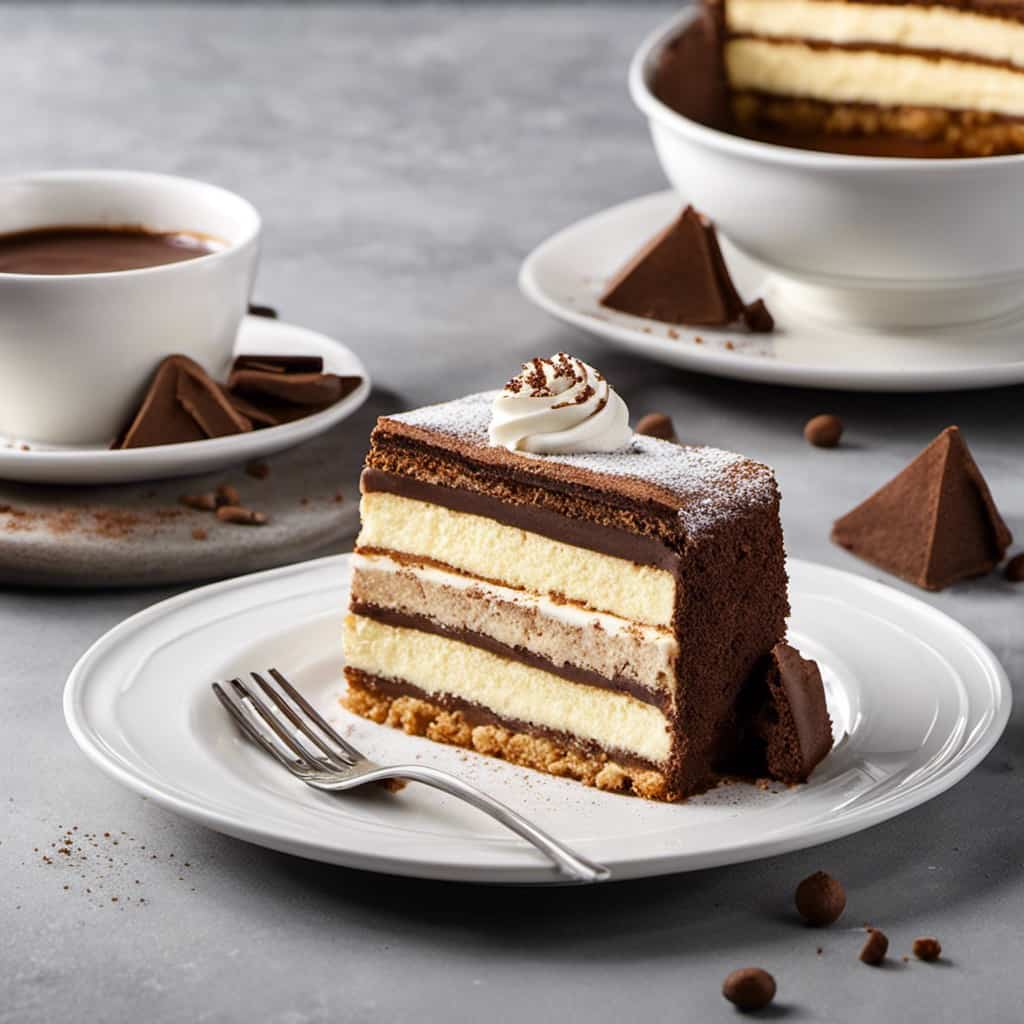
It’s interesting to note that Dunkin’ Donuts offers a variety of milk alternatives, such as almond milk and oat milk, for an additional charge of $0.50.
Justin is a seasoned author, coffee and tea enthusiast, and an essential member of the Cappuccino Oracle team. With a keen appreciation for the complexities of coffee, coffee alternatives, and tea, Justin has dedicated his professional career to exploring these realms and sharing his insights with readers worldwide.
Justin’s immersion in the world of coffee, coffee alternatives, and tea began at a young age, kindling a passion that extended beyond mere consumption. This love for these beverages led him to combine his talent for writing with his devotion to coffee and tea, bringing him to Cappuccino Oracle as a dedicated author.
Coffee Basics
How Much Is a Iced Coffee at Mcdonald’s

Do you have a hankering for a chilly iced coffee from McDonald’s? Don’t worry, we’ve got you covered! In this article, we’ll delve into the realm of McDonald’s iced coffees, examining their prices, sizes, flavors, and more.
So, whether you’re a fan of the classic regular iced coffee or prefer something a little more indulgent with flavored options, we’ll provide you with all the information you need to satisfy your caffeine cravings.
Let’s embark on this delightful journey together!
Key Takeaways
- The price of regular iced coffee at McDonald’s starts at $1.39 and may vary based on location and promotions.
- Flavored iced coffee at McDonald’s comes in small, medium, and large sizes, with prices starting at $2.49.
- McDonald’s offers a variety of flavors for their iced coffee, including vanilla, caramel, hazelnut, and mocha.
- Customers can customize their iced coffee with add-ons like flavored syrups, whipped cream, and extra espresso shots, but extra charges may apply.
Regular Iced Coffee Prices
Our regular iced coffee’s price at McDonald’s is determined by the size and any additional customization. The standard size for our regular iced coffee is 16 ounces, and it starts at $1.39. However, the price may vary depending on the location and any special promotions or discounts available.

At McDonald’s, we offer a variety of flavors for our iced coffee, including classic vanilla and caramel. As for the brewing methods, we use a combination of freshly brewed coffee and ice to create a refreshing and flavorful beverage.
Our goal is to serve our customers with a delicious and affordable iced coffee experience, ensuring that they have options to customize their drink according to their preferences.
Flavored Iced Coffee Prices
To determine the prices of flavored iced coffee at McDonald’s, we take into account the size and any additional customization options. McDonald’s offers a variety of flavored iced coffee options to suit different tastes. Some of the popular iced coffee flavors include caramel, vanilla, hazelnut, and mocha. Each flavor adds a unique twist to the classic iced coffee, providing customers with a refreshing and flavorful experience.
The prices for flavored iced coffee start at around $2.49 for a small size, $2.89 for a medium size, and $3.39 for a large size. These prices may vary depending on the location and any additional customization options, such as adding whipped cream or extra syrup.
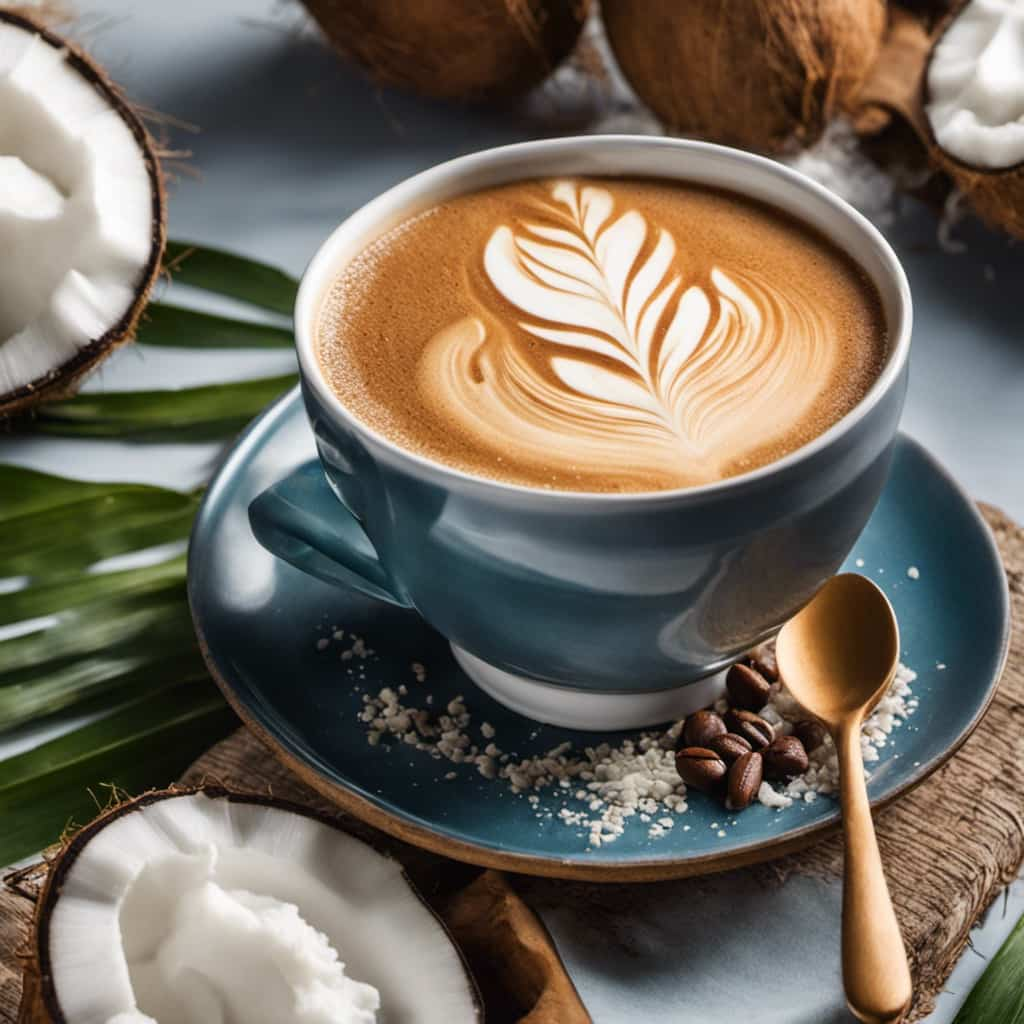
Now, let’s move on to discuss the different sizes and prices of McDonald’s iced coffee.
Iced Coffee Sizes and Prices
The prices and sizes of McDonald’s iced coffee offerings vary depending on the location and any additional customization options. McDonald’s offers a range of sizes for their iced coffee, including small (12 oz), medium (16 oz), and large (22 oz). Each size comes with its own price point, which also varies by location.
As for flavors, McDonald’s typically offers classic iced coffee options such as regular, vanilla, caramel, and mocha. The calories in McDonald’s iced coffee vary based on the size and any additional flavorings or toppings. It’s important to note that these numbers can also vary depending on the specific ingredients used at different locations.
Now that we’ve covered the sizes and prices of McDonald’s iced coffee, let’s move on to discuss the available add-ons and any extra charges that may apply.

Iced Coffee Add-Ons and Extra Charges
For iced coffee at McDonald’s, there are various add-ons and extra charges available. If you’re looking to customize your iced coffee, you can choose from a range of options such as flavored syrups, whipped cream, and additional espresso shots. However, it’s important to note that these add-ons may come with extra charges.
The prices for customization vary depending on the specific add-on and the location of the McDonald’s restaurant. Some popular iced coffee flavors include vanilla, caramel, and mocha. These flavors can add a delicious twist to your iced coffee experience.
Keep in mind that the prices for add-ons and extra charges are subject to change, so it’s always a good idea to check with your local McDonald’s for the most accurate information.
Now let’s move on to the next section and explore the exciting world of iced coffee discounts and promotions.

Iced Coffee Discounts and Promotions
Now let’s explore the exciting world of iced coffee discounts and promotions at McDonald’s.
McDonald’s frequently offers specials and promotions on their iced coffee, allowing customers to enjoy their favorite flavors at a discounted price. These promotions can vary by location and time of year, so it’s always a good idea to check with your local McDonald’s for current offers.
Some popular flavors of iced coffee at McDonald’s include caramel, vanilla, hazelnut, and mocha. These flavors can be enjoyed with or without cream and sugar, allowing for a customized experience.
Whether it’s a buy one get one free promotion or a discounted price for a limited time, McDonald’s offers a variety of ways to enjoy their delicious iced coffee at a great value.
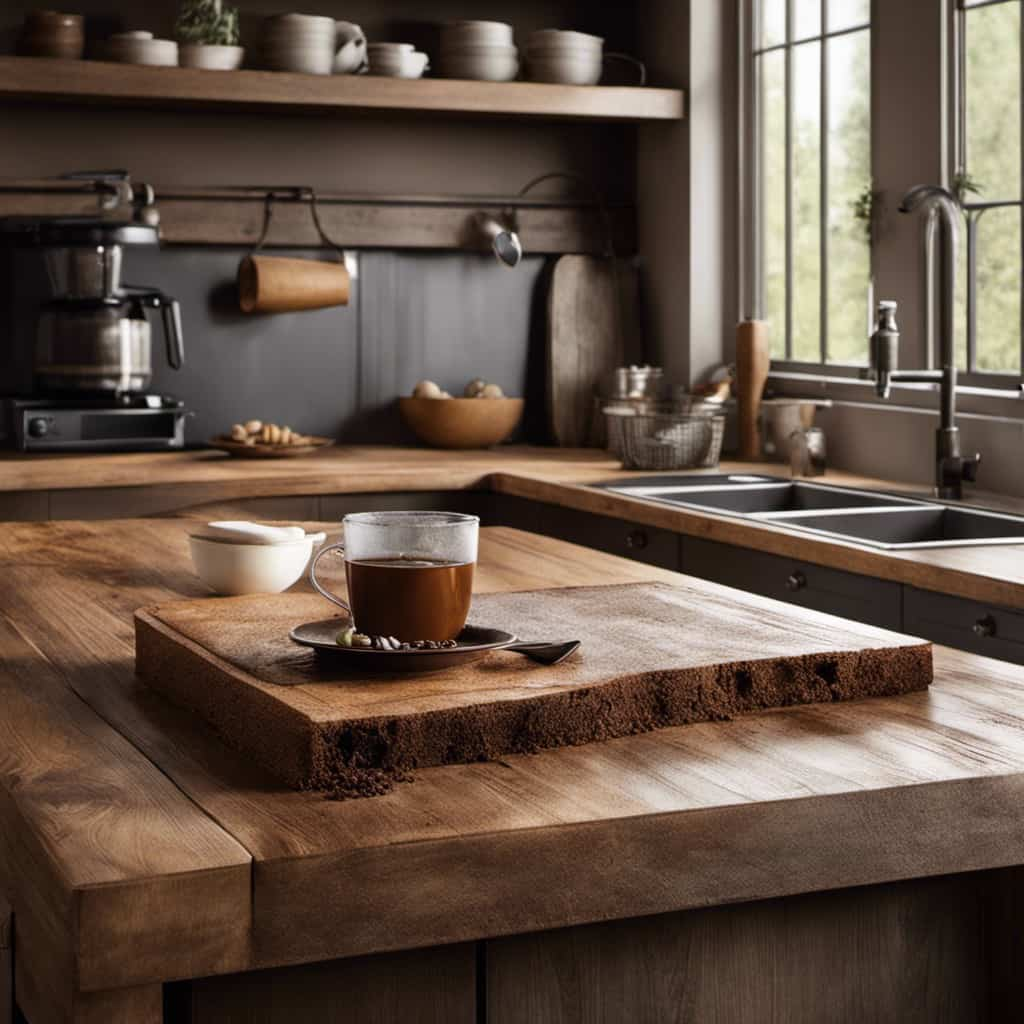
Frequently Asked Questions
What Are the Nutritional Facts for Mcdonald’s Regular Iced Coffee?
When it comes to McDonald’s regular iced coffee, there are customization options available to suit your preferences. Additionally, it’s worth noting the nutritional benefits of this refreshing beverage.
Can I Customize the Sweetness Level of My Flavored Iced Coffee at Mcdonald’s?
Yes, you can customize the sweetness level of your flavored iced coffee at McDonald’s. They offer a range of customization options, allowing you to adjust the sweetness to your liking. Additionally, they also have decaf iced coffee available.
Are There Any Seasonal or Limited-Time Flavors Available for Mcdonald’s Iced Coffee?
Seasonal flavor options and special promotions for our iced coffee are available at McDonald’s. We offer a variety of limited-time flavors to satisfy your taste buds and keep things exciting.
Does Mcdonald’s Offer Any Non-Dairy Milk Options for Their Iced Coffee?
At McDonald’s, we offer non-dairy milk options for our iced coffee, making it vegan-friendly. Customers can choose from alternatives like almond milk or oat milk to enjoy their refreshing iced coffee.
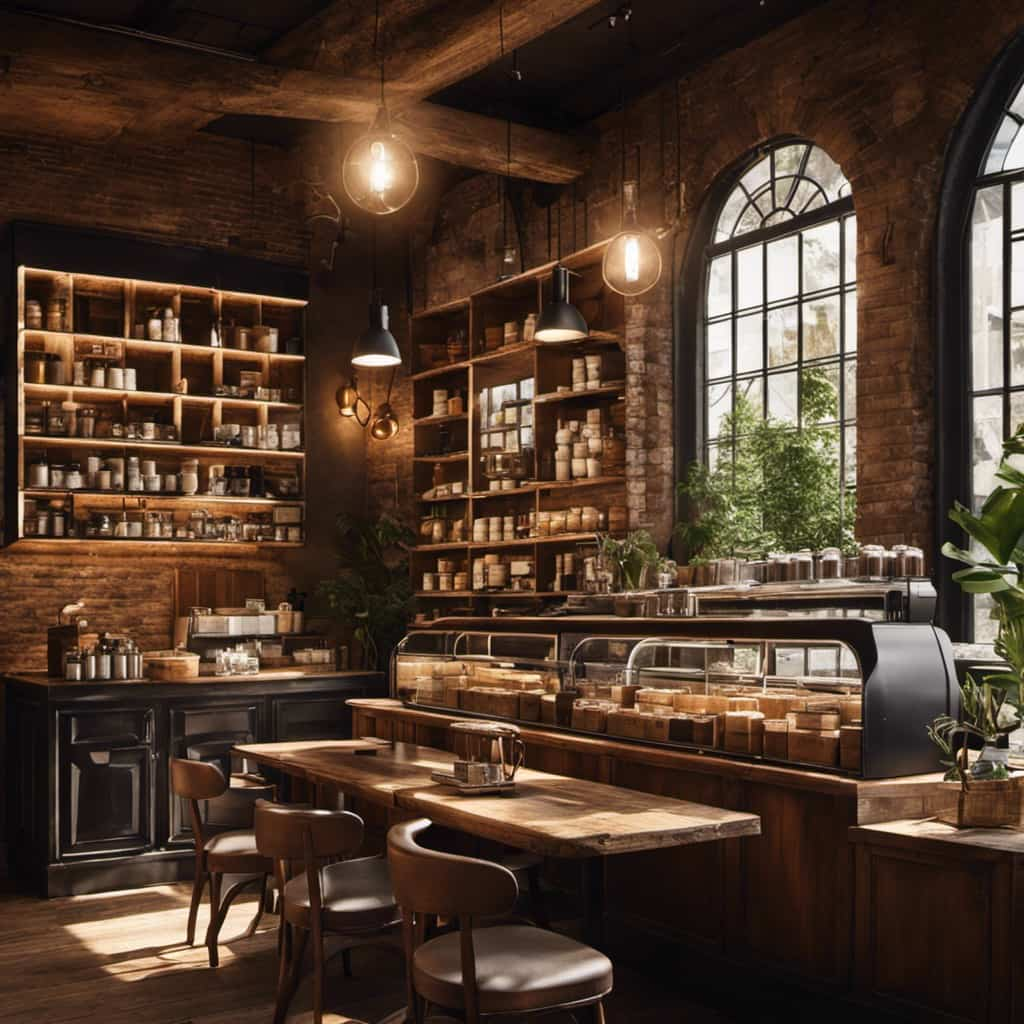
Are There Any Secret Menu Items or Hacks for Getting a Cheaper Iced Coffee at Mcdonald’s?
The best ways to save money at McDonald’s include ordering customized drinks. Tips for ordering at fast food restaurants can help you get cheaper iced coffee. Try secret menu items or hacks for discounts.
Conclusion
In conclusion, McDonald’s offers a variety of iced coffee options at reasonable prices. The regular iced coffee starts at just $1.99, while the flavored ones are slightly higher at $2.49. Customers can choose from different sizes, ranging from small to large, with corresponding prices.
Additionally, there are various add-ons available for an extra charge. It’s worth checking for any discounts or promotions to make the most out of your iced coffee experience at McDonald’s.
Justin is a seasoned author, coffee and tea enthusiast, and an essential member of the Cappuccino Oracle team. With a keen appreciation for the complexities of coffee, coffee alternatives, and tea, Justin has dedicated his professional career to exploring these realms and sharing his insights with readers worldwide.
Justin’s immersion in the world of coffee, coffee alternatives, and tea began at a young age, kindling a passion that extended beyond mere consumption. This love for these beverages led him to combine his talent for writing with his devotion to coffee and tea, bringing him to Cappuccino Oracle as a dedicated author.
Coffee Basics
Nostalgic 90s Vibes: Coffee Rum Combos For Cocktails

Ah, the 90s. A time when grunge music dominated the radio, Walkmans were our cherished gadgets, and coffee shops were the go-to hangout spots. If you’re feeling nostalgic like me and longing for those days gone by, coffee rum cocktails are a great way to reminisce and take a trip down memory lane.
Picture this: it’s a warm summer evening, the sun is setting, and you’re sitting on a porch swing, sipping on a deliciously smooth and indulgent cocktail. The combination of coffee and rum creates a flavor profile that is both unique and comforting, reminiscent of the era we hold dear.
Now, there are two tried and tested coffee rum combinations that are sure to satisfy your craving for those 90s vibes.
The Boozy Java Float, with its rich blend of brewed coffee, dark rum, Kahlua liqueur, melted chocolate, and topped with whipped cream or vanilla ice cream, is a true indulgence.
Or, if you prefer something simpler, the Jamaica Coffee, made with brewed coffee, dark rum, coffee flavored liqueur, whipped cream, and a chocolate coffee bean garnish, is a classic choice.
To truly elevate your coffee rum cocktails, be sure to use freshly brewed coffee and high-quality dark rum. And don’t forget the optional toppings like nutmeg and chocolate shavings for that extra burst of flavor.
So, why not channel your inner 90s vibes and enjoy the nostalgia with these delightful coffee rum combos? It’s time to indulge in a taste of the past.
Key Takeaways
- Coffee and rum make a great combination for cocktails, with two tested coffee rum combinations: Boozy Java Float and Jamaica Coffee.
- Recommended ingredients for coffee rum cocktails include freshly brewed coffee, high-quality dark rum, and optional toppings like nutmeg and chocolate shavings.
- Spiced rum is good for sipping and adds flavor to cocktails, while coffee liqueur is a concentrated alcoholic version of a coffee cocktail.
- Coffee rum cocktails have a nostalgic 90s vibe and can be made in 10 minutes or less, with many variations to try.
What’s in it?
I’ll tell you what’s in these nostalgic 90s coffee rum cocktails. The history of coffee and rum cocktails goes way back, and it’s no wonder why they make such a great combination.
When exploring the flavor profiles of different types of rum in coffee cocktails, you’ll discover that darker rum can add a rounded and rich flavor. Spiced rum, on the other hand, is perfect for sipping or adding a flavorful twist to your cocktails.
To create these delightful concoctions, start by whisking together freshly brewed coffee, a coffee-flavored liqueur, and dark rum. If you have a sweet tooth, adding brown sugar to your mug will give it that extra touch of sweetness.
Finish off the cocktail with a dollop of homemade whipped cream and a sprinkle of nutmeg or shaved chocolate. Now you’re ready to enjoy the nostalgic 90s vibes of these coffee rum cocktails!
Different Combinations
Exploring various combinations of these 90s favorites reveals new and exciting flavors for the adventurous palate. When it comes to coffee rum cocktails, there are unique twists on classic recipes that can take your taste buds on a journey. One such twist is the addition of coconut cream to create a tropical vibe. Another option is to infuse the rum with spices like cinnamon and nutmeg for a warm and comforting flavor profile.
In addition to these variations, exploring international combinations of coffee rum cocktails can open up a world of possibilities. For example, in Spain, the Carajillo is made with a shot of espresso and a splash of rum, creating a rich and bold drink. In Italy, the Caffè Corretto adds a shot of rum to a traditional espresso, adding a touch of sweetness and depth.
By experimenting with different ingredients and techniques, you can create your own unique coffee rum combinations that will transport you back to the nostalgic 90s while adding a modern twist. So, grab your favorite coffee beans, premium dark rum, and let your creativity run wild in crafting the perfect coffee rum cocktail. Cheers!
| Unique Twists | International Variations |
|---|---|
| Coconut cream | Carajillo (Spain) |
| Spiced rum | Caffè Corretto (Italy) |
Tips and Recommendations
To enhance the flavors of your coffee rum creations, consider incorporating additional ingredients and techniques. Here are some tips and recommendations to take your coffee rum cocktails to the next level:
-
Experiment with Different Coffee Rum Brands:
- Try using premium coffee rum brands like KonaRed Coffee Rum or Mr. Black Cold Brew Coffee Liqueur for a truly rich and flavorful experience.
- Don’t be afraid to mix different brands together to create unique flavor profiles.
-
Best Coffee Rum Cocktails:
- Explore classic recipes like the Espresso Martini, which combines coffee rum, vodka, and espresso for a bold and energizing cocktail.
- For a tropical twist, try the Coconut Rum Iced Coffee, blending coffee rum, coconut rum, and cold brew coffee over ice.
-
Get Creative with Garnishes:
- Elevate your coffee rum cocktails with garnishes like cinnamon sticks, chocolate-covered espresso beans, or even a sprinkle of sea salt for a touch of sophistication.
Remember, the key to a great coffee rum cocktail is using high-quality ingredients and experimenting with different flavor combinations. Cheers to nostalgic 90s vibes and unforgettable coffee rum experiences!
Frequently Asked Questions
Are there any non-alcoholic alternatives for coffee rum cocktails?
Yes, there are non-alcoholic alternatives for coffee rum cocktails. Creative ways to infuse coffee flavors into non-alcoholic drinks include using coffee syrups, cold brew concentrate, or coffee-flavored soda. These options provide the same coffee taste without the alcohol.
Can I use flavored rum instead of dark rum in coffee rum cocktails?
Yes, you can definitely use flavored rum instead of dark rum in coffee rum cocktails. It adds a unique twist to the drink and allows for more creativity in terms of flavor combinations. There are endless variations of coffee rum cocktails to explore with flavored rum alternatives.
How can I make a coffee rum cocktail without whipped cream or ice cream?
Making a coffee rum cocktail without whipped cream or ice cream? No problem! Try using alternative sweeteners like honey or maple syrup. And for unique garnishes, experiment with cinnamon sticks, citrus peels, or even a sprinkle of cocoa powder. Cheers!
Are there any coffee rum cocktails that use a different type of coffee bean?
For creative twists on traditional coffee rum cocktails, try using different coffee bean flavors like Ethiopian Yirgacheffe or Costa Rican Tarrazu. These unique beans can add depth and complexity to your coffee rum concoctions.
Can I substitute coffee liqueur with another type of alcoholic beverage in coffee rum cocktails?
Yes, you can substitute coffee liqueur with other alcoholic beverages in coffee rum cocktails. Try using amaretto for a nutty twist or Irish cream for a creamy flavor. Get creative and experiment with different combinations!
Conclusion
In conclusion, these coffee rum combos are the perfect way to bring back the nostalgic 90s vibes. The Boozy Java Float and Jamaica Coffee offer unique and delicious flavor profiles that’ll transport you back in time. By using freshly brewed coffee and high-quality dark rum, you can ensure the best taste experience.
Don’t forget to add optional toppings like nutmeg and chocolate shavings for that extra burst of flavor. So, sip, savor, and succumb to the sensational sensations of these sensational coffee rum concoctions.
Arf, an author and an innovative enthusiast of coffee, coffee alternatives, and tea, plays a crucial role as a contributor to the esteemed Cappuccino Oracle platform. Renowned for his curiosity and passion for these captivating beverages, Arf has carved out a unique space for himself in the world of exploration and writing. He realized that coffee, coffee alternatives, and tea are not mere drinks to keep one awake, but universes of flavors and stories waiting to be explored.
Arf’s articles for Cappuccino Oracle blend meticulous research with personal experiences, providing readers with an in-depth understanding of various types of coffee, coffee alternatives, and tea, along with their unique characteristics, cultures, and histories. His honest reviews and engaging narratives guide readers on their own journeys, helping them discover their preferences and find their perfect brew.
-
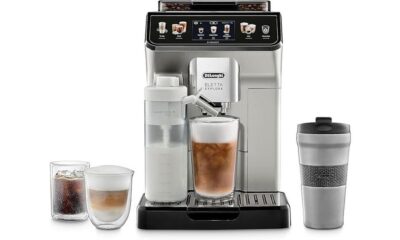
 Espresso Machines Reviews3 weeks ago
Espresso Machines Reviews3 weeks agoDeLonghi Eletta Explore: A Comprehensive Review [2025]
-

 Espresso Machines Reviews4 weeks ago
Espresso Machines Reviews4 weeks agoILAVIE 20 Bar Espresso Machine Review (2025)
-

 Espresso Machines Reviews4 weeks ago
Espresso Machines Reviews4 weeks agoSUMSATY Espresso Machine Review (2025)
-
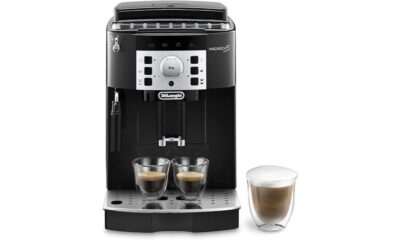
 Espresso Machines Reviews3 weeks ago
Espresso Machines Reviews3 weeks agoDeLonghi Magnifica S ECAM22.110.B Review: A Coffee Lover's Dream [2025]
-
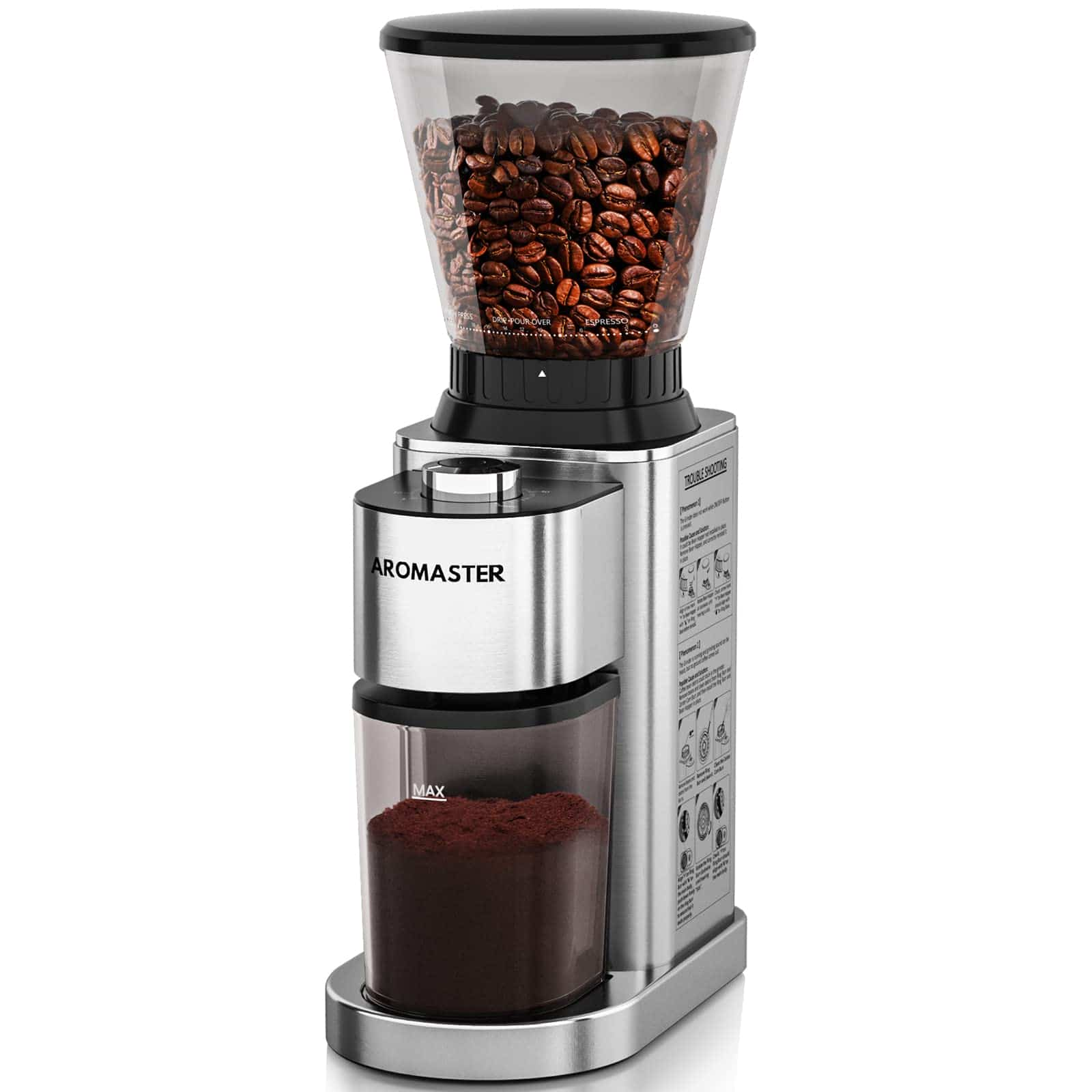
 Coffee Grinders Reviews4 weeks ago
Coffee Grinders Reviews4 weeks agoAromaster Burr Coffee Grinder Review (2025)
-

 Espresso Machines Reviews4 weeks ago
Espresso Machines Reviews4 weeks agoMAttinata Espresso Machine Review (2025)
-
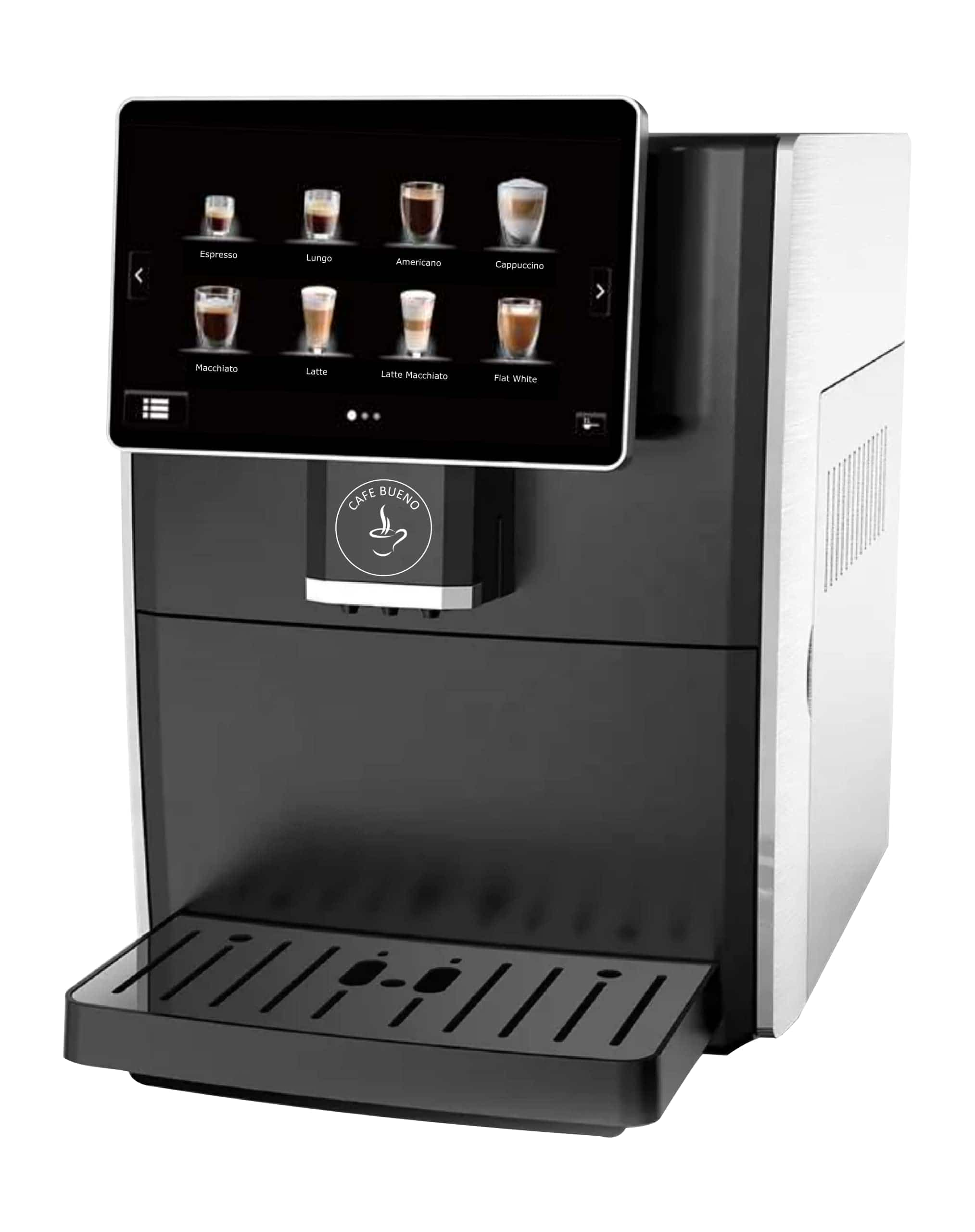
 Espresso Machines Reviews4 weeks ago
Espresso Machines Reviews4 weeks agoCafe Bueno Super Automatic Espresso Machine Review (2025)
-
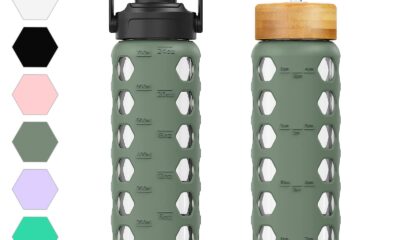
 Cappuccino Oracle Selected Reviews3 weeks ago
Cappuccino Oracle Selected Reviews3 weeks agoBest Glass Water Bottles for Eco-Friendly Hydration [2025]





























